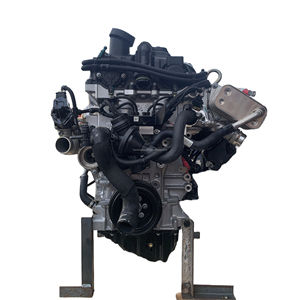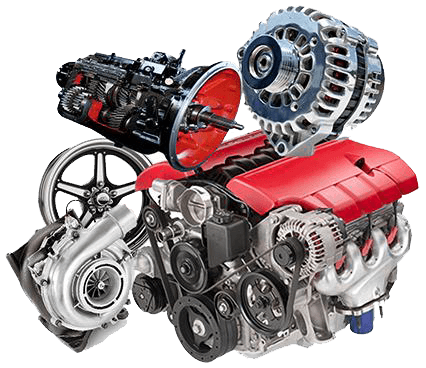Import Engines: Every Little Thing You Required to Know Prior To Purchasing
Import Engines: Every Little Thing You Required to Know Prior To Purchasing
Blog Article
An Extensive Comparison of Different Kinds Of Import Engines and Their Applications in Numerous Vehicles
As the automobile market remains to advance, the choice of engines for cars ends up being progressively diverse, each offering distinct advantages and applications. From the performance of turbocharged engines to the environmental friendliness of electric powertrains, the spectrum of import engines offered in today's market provides to a vast selection of driving demands and choices. Whether it's the torque of a diesel motor or the non-traditional style of a rotary engine, comprehending the nuances of each type and how they align with specific vehicle needs can significantly impact efficiency, gas economic situation, and total driving experience. By checking out the ins and outs of these import engines and their applications in different cars, a more clear image arises of the complex balance between modern technology, efficiency, and sustainability in the contemporary automotive landscape.
Turbocharged Engines
Turbocharged engines, understood for their capability to boost power output successfully, have become significantly prevalent in modern-day car layouts. By utilizing exhaust gases to drive a generator that compresses inbound air into the engine, turbochargers properly enhance the quantity of air and fuel blend that can be combusted, resulting in boosted performance without substantially increasing engine dimension. This modern technology enables suppliers to downsize engines, causing better fuel effectiveness while keeping power levels similar to bigger, naturally aspirated engines.

Hybrid Engines
With the advancements in engine technology helping with enhanced performance and efficiency, the automotive sector has actually seen an increase in the combination of hybrid engines as a sustainable solution for power distribution. Crossbreed engines integrate the benefits of both internal burning engines and electric motors to provide better gas effectiveness and decreased emissions. By flawlessly switching over between both power resources or using them concurrently, hybrid engines provide flexibility in various driving problems.

In addition, hybrid innovation is not restricted to a certain vehicle kind, with applications ranging from small sedans to bigger SUVs and even high-performance cars. As ecological issues and gas efficiency laws become significantly popular, hybrid engines stand for a significant step in the direction of sustainable transport solutions.
Electric Engines
Electric engines have changed the automobile sector with their efficient and environmentally-friendly power delivery systems. import engines. These engines operate by transforming electric energy into power, using a quiet and smooth driving experience. Unlike conventional burning engines, electrical engines create no tailpipe discharges, lowering the general carbon impact of vehicles and assisting battle air contamination
One of the essential advantages of electrical engines is their high power efficiency, usually transforming over 80% of the electric power into propulsion. This efficiency equates right into price financial savings for customers through decreased fuel costs. Furthermore, electrical engines call for much less maintenance compared to internal combustion engines, as they have fewer moving parts that can break gradually.
Electric engines are generally made use of in electrical vehicles (EVs) and crossbreed electric vehicles (HEVs) EVs rely solely on electric engines for propulsion, drawing power from rechargeable batteries. On the other hand, HEVs combine electric engines with traditional internal burning engines to maximize gas performance and lower exhausts. The convenience and sustainability of electrical engines make them an encouraging remedy for the future of transport.
Diesel Engines
Diesel motor are renowned for their exceptional fuel effectiveness and durable efficiency in a selection of automotive imp source applications. These engines operate by pressing air in the cyndrical tubes, which brings about high temperatures that fire up the infused diesel gas without the visit this web-site requirement for stimulate plugs. This burning approach gives diesel motor with greater torque results compared to gasoline engines, making them perfect for heavy-duty cars like trucks, buses, and building devices.
One of the essential advantages of diesel engines is their exceptional fuel efficiency, as they can travel further on a gallon of gas contrasted to fuel engines. This performance is especially helpful for long-haul transport and industrial fleets, where decreasing fuel costs is a significant factor. In addition, diesel motor are understood for their toughness and durability, needing less upkeep over their life-span contrasted to gas engines.
Over the last few years, advancements in diesel motor innovation have also concentrated on minimizing emissions to fulfill strict ecological regulations. Modern diesel motor are equipped with innovative discharges control systems, such as diesel particle filters and discerning catalytic decrease, which assist decrease contaminants launched into the environment - import engines. These growths have actually made diesel motors cleaner and extra eco-friendly while retaining their performance and performance features
Rotary Engines
Renowned for their special design and efficiency qualities, rotating engines provide a distinctive option to typical combustion engine modern technologies like diesel engines. These engines, additionally known as Wankel engines, run on a different concept contrasted to conventional piston engines. Rather of using pistons going up and down in cyndrical tubes, rotating engines utilize a triangular blades that rotates in an epitrochoidal path within a chamber. This style causes a compact engine with high power result about its size and weight.

Final Thought
To conclude, the comparison of various sorts of import engines highlights the diversity of options readily available for numerous automobiles. Turbocharged engines supply boosted power and effectiveness, hybrid engines incorporate electrical and standard power resources for enhanced fuel economy, electrical engines provide a tidy and sustainable choice, diesel motor are known for their sturdiness and torque, and rotary engines use a distinct design with capacity for high performance. Each engine kind has its own toughness and applications in the automobile sector.
Furthermore, hybrid engines add to a quieter driving experience and typically provide a smoother velocity contrasted to standard internal burning engines.
Renowned for their special design and performance features, rotary engines offer an unique alternative to conventional burning engine innovations like diesel engines. These engines, additionally known as Wankel engines, run on a different concept compared to standard piston engines. In spite of these limitations, rotating engines continue to draw in enthusiasts and makers looking for a different engine modern technology with distinct advantages.
Turbocharged engines offer raised power and effectiveness, crossbreed engines combine electrical and traditional power sources for enhanced fuel economic climate, electrical engines offer a tidy and sustainable choice, diesel engines are known for their durability and torque, and rotating engines provide an unique style with potential for high efficiency.
Report this page